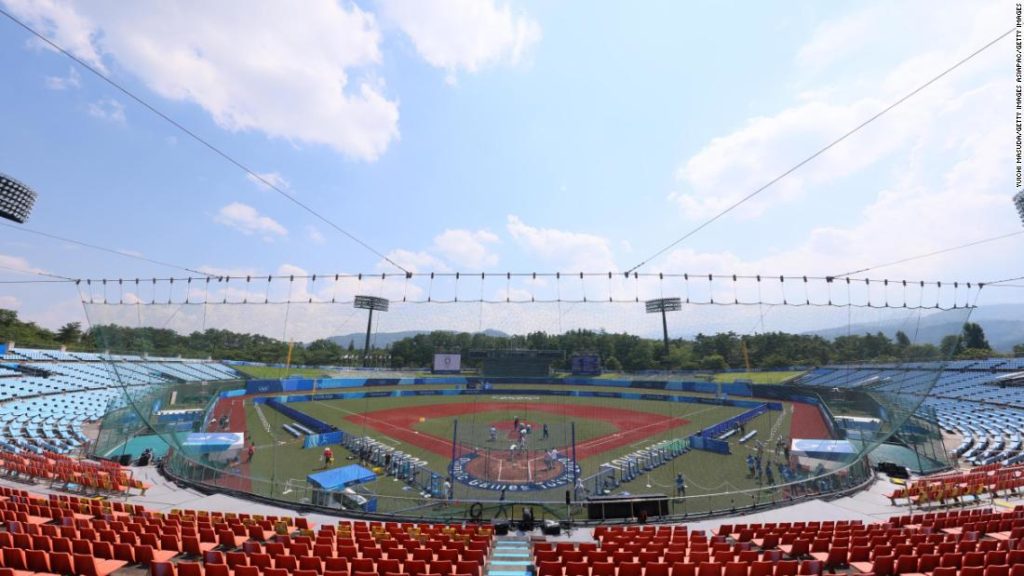It’s a particular disappointment for the city of Fukushima, where the Olympics was supposed to celebrate the region’s recovery from a nuclear disaster more than a decade ago.
Unlike Tokyo, Fukushima Prefecture is not currently under a coronavirus state of emergency, but a decision was still made to host the seven games at the Fukushima Azuma Baseball Stadium — six softball and one baseball — without supporters.
That’s despite fans being allowed to attend other sporting events outside the Olympics in the region.
“We have genuinely dreamed of people all over the world coming to visit Fukushima, and we expected them to find out the attractiveness of Fukushima,” Akinori Iwamura, a former Major League Baseball player and now manager of semi-pro baseball side, the Fukushima Red Hopes, tells CNN.
“Although we have not recovered our towns fully, we wanted to tell everyone how Fukushima has been rebuilt in the last ten years. It is pretty unfortunate to have no spectators at the games.”
Baseball enjoys considerable popularity in Japan and Iwamura is one of a host of Japanese players to have played professionally in the United States.
Japan is scheduled to play against the Dominican Republic on Wednesday — the opening game of the competition — and Iwamura can’t help feeling disappointed by the circumstances surrounding the sport’s return to the Olympics in Fukushima.
“The Tokyo Olympics was a great chance for spectators to get relief from stress by watching the baseball games,” he says. “Indeed, many people tend to be tired because of Covid-19. Getting enthusiastic is something essential for people.”
Iwamura adds that staging the Olympics in Japan is “controversial,” but hopes that a successful Games can “spread the possibilities of overcoming difficulties” — a particularly important message for Fukushima and one the city hopes to embody by hosting global sporting events.
“Even in Japan, the image of Fukushima is largely affected by the earthquake and nuclear disasters,” Wataru Kokubun, a pitcher for the Red Hopes, tells CNN.
“It is such a pity that we missed the opportunity to show the reality of Fukushima to people living outside the prefecture and to the world during the Olympics. I wish we could show that Fukushima is so energetic that we even forget the effect of disasters.”
While most Olympic events are being held in Tokyo, a few are being staged outside the capital. As well as the baseball and softball games in Fukushima, some football games will be played in the neighboring Miyagi prefecture, while other football games, the marathon, and race walking events are being held further north in Sapporo.
Japan’s medal tally in baseball stands at two bronze medals in 1992 and 2004 and a silver in 1996; a gold medal this time around would be an historic achievement.
“Japan is a country very good at baseball,” Fumiya Saitoh, another Red Hopes pitcher, tells CNN. “I want to see Japan win the world championship.”
There is, however, continued frustration that MLB players are unable to represent their countries at the Games.
“It’s sad that Ohtani and others can’t represent Japan,” Saitoh adds. “I would have liked to see Japanese players in the major leagues play for Japan.”
You may also like
-
Super League: UEFA forced to drop disciplinary proceedings against remaining clubs
-
Simone Biles says she ‘should have quit way before Tokyo’
-
Kyrie Irving: NBA star the latest to withhold vaccination status
-
Roger Hunt: English football mourns death of Liverpool striker and World Cup winner
-
‘Every single time I lift the bar, I’m just lifting my country up’: Shiva Karout’s quest for powerlifting glory

